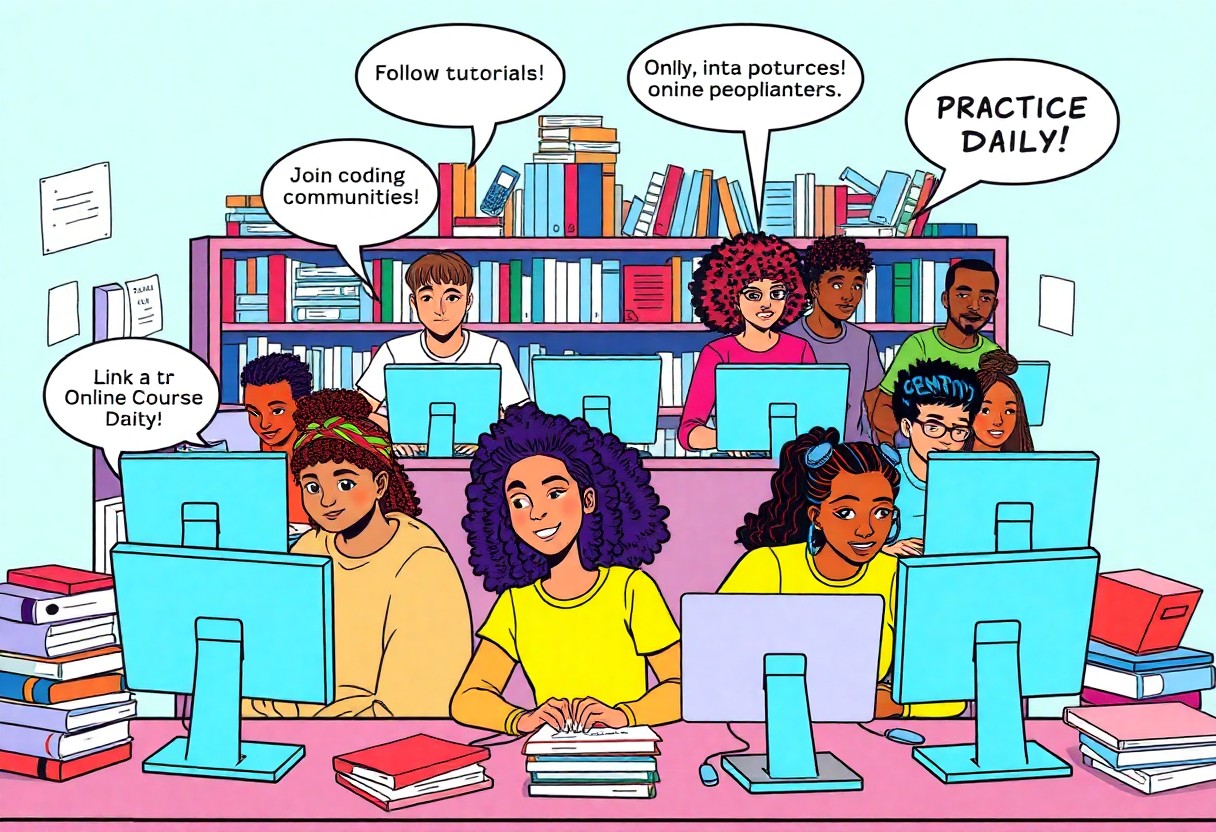You can unlock a rewarding career in software development without a formal degree by leveraging various online resources. I will guide you through proven strategies and free or low-cost platforms that will equip you with the necessary skills to succeed. You will discover how to structure your learning journey, gain practical experience, and build a strong portfolio that showcases your abilities. With the right approach and dedication, you can effectively transition into this high-demand field.
Key Takeaways:
- Utilize free and paid online courses to build foundational knowledge and skills in programming languages and technologies.
- Engage in hands-on projects and contribute to open-source initiatives to gain practical experience and a portfolio.
- Join online communities and forums to network, seek mentorship, and stay updated with industry trends and best practices.
How-to Get Started in Software Development
Identify Your Learning Objectives
Before stepping into software development, define your learning objectives. Consider whether you want to specialize in web development, mobile app creation, or systems programming. Be specific about your goals, such as mastering a particular programming language or building a specific project, which will guide your learning path and keep you focused.
Choose the Right Learning Resources
Selecting effective learning resources accelerates your journey. I recommend platforms like Codecademy, freeCodeCamp, and Udacity, which offer structured courses tailored to varying skill levels. Books such as “You Don’t Know JS” for JavaScript or “Automate the Boring Stuff with Python” provide excellent foundational knowledge. Participate in community forums like Stack Overflow or GitHub to enhance practical skills through collaboration.
Utilizing the right resources can significantly influence your learning experience. Online courses often provide interactive projects that mimic real-world scenarios, making the content engaging and easier to grasp. Bootcamps are intensive and often provide mentorship, while books offer in-depth coverage of specific topics. Consider mixing these methods; for instance, complementing video tutorials with practical coding exercises or algorithm challenges from sites like LeetCode. Assess reviews and community feedback to choose resources that align with your objectives and learning style.

Essential Tips for Effective Online Learning
- Set goals to stay focused
- Limit distractions in your environment
- Utilize various resources for comprehensive learning
- Practice regularly to reinforce skills
Knowing this will help you maximize your online learning experience and develop your skills effectively.
Set a Structured Learning Schedule
Creating a structured learning schedule is key to progressing in software development. Allocate specific time slots each day or week solely dedicated to studying programming concepts and practicing coding. This consistency not only fosters a routine but also enhances your ability to absorb new information without feeling overwhelmed. By setting clear deadlines for completing courses or projects, you hold yourself accountable for your learning journey.
Join Online Communities and Forums
Participating in online communities and forums can significantly enhance your learning experience. These platforms offer opportunities to ask questions, share your work, and receive feedback from others who share your interests. Sites like Stack Overflow, Reddit, and GitHub are excellent for connecting with fellow developers across various skill levels. Engaging in discussions can expose you to different perspectives, and resources, and even lead to mentorship opportunities.
Joining online communities can also provide insight into industry trends and job opportunities. For instance, many developers find jobs through networking on platforms like LinkedIn and GitHub, where showcasing personal projects complements your resume. Additionally, the camaraderie and moral support found in these groups encourage you to persist through challenges, making them an invaluable resource in your learning process.
Factors to Consider When Learning Software Development
Choosing to learn software development online requires careful thought about several key factors. Consider your own learning style, the course content, and the format that best suits your lifestyle. Evaluate platforms that offer flexible schedules and cover relevant technologies. Identify your goals, whether it’s mastering a specific language or developing a full-stack application. The decision you make can significantly impact your journey.
- learning style
- course content
- format
- goals
Understanding Different Learning Styles
Identifying your learning style is vital to effectively mastering software development. Some individuals thrive in visual environments, utilizing diagrams and videos, while others prefer hands-on experiences through coding projects. I often find that engaging in coding challenges or participating in online communities helps reinforce my understanding. Tailoring your resources to fit your unique learning approach can greatly enhance your skill acquisition.
Evaluating Course Content and Format
Examining the course content and format is vital for ensuring a comprehensive education in software development. I prioritize programs that offer up-to-date material reflecting industry trends, as this keeps my skills relevant. Consider whether a course is self-paced, provides mentorship, or includes project-based learning, which can significantly improve understanding through application. The right format will support you in building a robust portfolio, which can be vital for future job opportunities.
Continued evaluation of course content and format is necessary throughout your learning journey. Look for programs with a clear syllabus and project deliverables that align with current industry standards. Real-world applications and peer reviews can provide additional insights into both the effectiveness of the course and the quality of resources. If a course emphasizes outdated technologies or lacks interactivity, seek alternatives. Programs that offer feedback mechanisms or community support can enhance your learning experience and facilitate better retention of information.
Recommended Online Platforms and Resources
Utilizing the right online platforms can streamline your path to Becoming a Software Developer Without a Degree. Websites like Codecademy, Udacity, and freeCodeCamp offer structured learning in coding fundamentals, web development, and data science. Real project experience through these formats enhances your skills and boosts your portfolio, making you more attractive to potential employers.
MOOCs and Coding Bootcamps
MOOCs (Massive Open Online Courses) and coding bootcamps provide intensive, focused training in software development. Platforms like Coursera and edX offer courses designed by renowned universities. Alternatively, bootcamps like General Assembly and Le Wagon deliver hands-on experience in a short time frame, often culminating in a final project that showcases your abilities to recruiters.
Books, Tutorials, and Additional Resources
Books and online tutorials serve as excellent supplements to your learning journey. Titles like “You Don’t Know JS” by Kyle Simpson or “Eloquent JavaScript” by Marijn Haverbeke are instrumental for grasping complex concepts. Additionally, websites like W3Schools and MDN provide comprehensive documentation and tutorials that are invaluable for practical coding reference.
The variety of resources available today means you can tailor your learning experience. Dive into books that cover specific programming languages, or explore video tutorials on YouTube that walk you through real-time coding exercises. Online forums like Stack Overflow and Reddit’s r/learnprogramming are great for getting help and sharing insights with fellow learners. For a hands-on experience, consider open-source projects on GitHub to collaborate with others and refine your skills in a community setting.
Building Practical Skills through Projects
Engaging in hands-on projects is vital for developing practical software development skills. Real-world applications help solidify theoretical knowledge while enhancing your problem-solving abilities. Working on projects allows you to experiment with various technologies and tools, providing a richer learning experience. By building projects, I can identify gaps in my understanding and seek targeted resources to address those weaknesses. Ultimately, this approach fosters true competence and confidence in software development.
Start with Personal Projects
Personal projects are an excellent starting point for honing your software development skills. By selecting a project that interests you, I can apply concepts I’ve learned and explore new technologies in a low-stakes environment. Whether it’s a simple web app or a more complex program, the key is to challenge yourself and grow through each iteration. I often find that personal projects reveal the most about my capabilities and areas for improvement.
Contribute to Open Source Initiatives
Getting involved in open source projects presents a unique opportunity to collaborate with established developers and gain insights into real-world software development practices. For instance, contributing to platforms like GitHub exposes you to varied coding styles and complex problem-solving approaches, enriching your learning experience. The accessibility of these projects means I can work on issues ranging from bug fixes to feature enhancements, allowing you to learn while providing value to the community.
Many popular open source projects, such as Mozilla Firefox and Linux, welcome contributions from developers at all skill levels. Start by navigating GitHub issues to identify “good first issues” that are tagged for newcomers. Engaging with a community of like-minded developers accelerates your learning curve, as you’ll receive feedback on your code and best practices. Furthermore, showcasing your contributions in your portfolio enhances your credibility when applying for jobs, demonstrating your commitment to continued learning and collaboration within the industry.
Networking and Job Opportunities in Tech
Networking in the tech industry can significantly enhance your job prospects. Engaging with professionals through meetups, online forums, and conferences allows you to build meaningful connections. Many positions are filled through referrals, so nurturing your network increases your chances of being noticed. Consider joining local tech groups or online communities to stay informed about industry trends and job openings.
Leveraging Social Media and Professional Networks
Utilizing platforms like LinkedIn can create opportunities for connecting with industry leaders and recruiters. Sharing your projects and insights boldly showcases your skills and interests. I actively engage with relevant content, join discussions, and endorse skills, which fosters connections and enhances visibility. Building a strong online presence can open doors to potential job offers and collaborations.
Preparing for Interviews and Showcasing Skills
Thorough preparation for interviews can set you apart from other candidates. I focus on understanding the company’s tech stack, practicing common technical questions, and participating in mock interviews. Showcasing my skills through a portfolio of projects demonstrates real-world experience, making a strong case for my capabilities. Tailoring my resume to highlight relevant experience also significantly increases my chances of landing interviews.
In today’s competitive landscape, preparing for interviews effectively involves more than just rehearsing answers. I immerse myself in the specific technologies each company uses, enabling me to discuss their applications confidently. Engaging in *coding challenges* on platforms like LeetCode prepares me for the technical aspects. Additionally, I emphasize soft skills such as teamwork and problem-solving during the interview. A compelling *portfolio*, featuring completed projects, further illustrates my practical abilities and aligns with the employer’s needs, enhancing my overall appeal as a candidate.
Summing up
Considering all points, learning software development online without a degree is entirely achievable through dedication and the right resources. I recommend starting with structured online courses, engaging in practical projects, and actively participating in coding communities to enhance my skills. By focusing on building a strong portfolio and networking with industry professionals, you can effectively demonstrate your abilities and secure opportunities in this dynamic field. Your commitment to continuous learning and hands-on experience will be key to your success in software development.
FAQ
Q: What are the best online resources for learning software development?
A: There are many resources available, including platforms like Codecademy, Coursera, edX, and Udemy. These sites offer various programming courses and bootcamps. Additionally, websites like freeCodeCamp and W3Schools provide free tutorials and projects to practice coding skills.
Q: How can I gain practical experience in software development without a degree?
A: Engage in real projects by contributing to open-source projects on GitHub. Build your own applications or participate in hackathons. Additionally, creating a portfolio showcasing your projects can demonstrate your skills to potential employers.
Q: Should I focus on a specific programming language initially?
A: Yes, it is beneficial to start with a popular and versatile language such as Python or JavaScript. These languages have extensive communities, resources, and libraries that can assist beginners in learning and creating applications more effectively.
